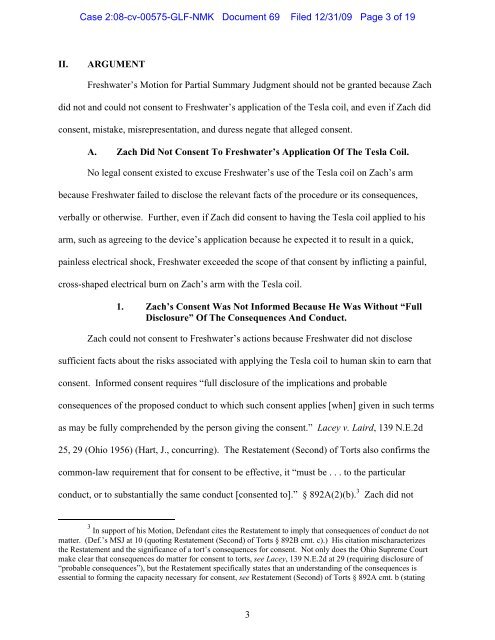Plaintiffs' memorandum in opposition to Defendant's motion for ...
Plaintiffs' memorandum in opposition to Defendant's motion for ...
Plaintiffs' memorandum in opposition to Defendant's motion for ...
Create successful ePaper yourself
Turn your PDF publications into a flip-book with our unique Google optimized e-Paper software.
Case 2:08-cv-00575-GLF-NMK Document 69 Filed 12/31/09 Page 3 of 19<br />
II.<br />
ARGUMENT<br />
Freshwater’s Motion <strong>for</strong> Partial Summary Judgment should not be granted because Zach<br />
did not and could not consent <strong>to</strong> Freshwater’s application of the Tesla coil, and even if Zach did<br />
consent, mistake, misrepresentation, and duress negate that alleged consent.<br />
A. Zach Did Not Consent To Freshwater’s Application Of The Tesla Coil.<br />
No legal consent existed <strong>to</strong> excuse Freshwater’s use of the Tesla coil on Zach’s arm<br />
because Freshwater failed <strong>to</strong> disclose the relevant facts of the procedure or its consequences,<br />
verbally or otherwise. Further, even if Zach did consent <strong>to</strong> hav<strong>in</strong>g the Tesla coil applied <strong>to</strong> his<br />
arm, such as agree<strong>in</strong>g <strong>to</strong> the device’s application because he expected it <strong>to</strong> result <strong>in</strong> a quick,<br />
pa<strong>in</strong>less electrical shock, Freshwater exceeded the scope of that consent by <strong>in</strong>flict<strong>in</strong>g a pa<strong>in</strong>ful,<br />
cross-shaped electrical burn on Zach’s arm with the Tesla coil.<br />
1. Zach’s Consent Was Not In<strong>for</strong>med Because He Was Without “Full<br />
Disclosure” Of The Consequences And Conduct.<br />
Zach could not consent <strong>to</strong> Freshwater’s actions because Freshwater did not disclose<br />
sufficient facts about the risks associated with apply<strong>in</strong>g the Tesla coil <strong>to</strong> human sk<strong>in</strong> <strong>to</strong> earn that<br />
consent. In<strong>for</strong>med consent requires “full disclosure of the implications and probable<br />
consequences of the proposed conduct <strong>to</strong> which such consent applies [when] given <strong>in</strong> such terms<br />
as may be fully comprehended by the person giv<strong>in</strong>g the consent.” Lacey v. Laird, 139 N.E.2d<br />
25, 29 (Ohio 1956) (Hart, J., concurr<strong>in</strong>g). The Restatement (Second) of Torts also confirms the<br />
common-law requirement that <strong>for</strong> consent <strong>to</strong> be effective, it “must be . . . <strong>to</strong> the particular<br />
conduct, or <strong>to</strong> substantially the same conduct [consented <strong>to</strong>].” § 892A(2)(b). 3<br />
Zach did not<br />
3 In support of his Motion, Defendant cites the Restatement <strong>to</strong> imply that consequences of conduct do not<br />
matter. (Def.’s MSJ at 10 (quot<strong>in</strong>g Restatement (Second) of Torts § 892B cmt. c).) His citation mischaracterizes<br />
the Restatement and the significance of a <strong>to</strong>rt’s consequences <strong>for</strong> consent. Not only does the Ohio Supreme Court<br />
make clear that consequences do matter <strong>for</strong> consent <strong>to</strong> <strong>to</strong>rts, see Lacey, 139 N.E.2d at 29 (requir<strong>in</strong>g disclosure of<br />
“probable consequences”), but the Restatement specifically states that an understand<strong>in</strong>g of the consequences is<br />
essential <strong>to</strong> <strong>for</strong>m<strong>in</strong>g the capacity necessary <strong>for</strong> consent, see Restatement (Second) of Torts § 892A cmt. b (stat<strong>in</strong>g<br />
3
















